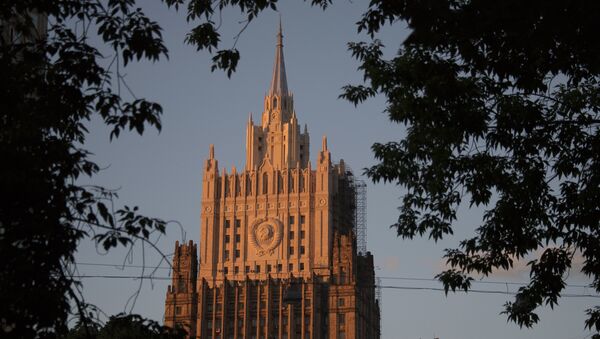Moscow considers Washington's attempt to impose snapback sanctions against Iran on September 20 'legally void', and all signatories to the Joint Comprehensive Plan of Action nuclear deal have similarly refused to recognize the legitimacy of the US's effort to trigger the restrictions, Russian Deputy Foreign Minister Sergei Ryabkov has said.
"We are forced to deal with an administration in the US which rejects common sense," Ryabkov said, speaking to journalists on Tuesday following a meeting of the Joint Commission of the JCPOA in Vienna.
Commenting on US Secretary of State Mike Pompeo's statement Thursday that UN snapback sanctions against Iran would return on September 20 after being triggered by Washington, the deputy foreign minister noted that the US deprived itself of having any say on the matter when it voluntarily withdrew from the Iran nuclear deal in 2018.
If any member of the @UN Security Council introduces a resolution to continue sanctions relief, the U.S. will oppose it. If no resolution is introduced, the sanctions on Iran will still return on September 20. That’s how UNSCR 2231 works. pic.twitter.com/KK7tyq0tJP
— Secretary Pompeo (@SecPompeo) August 27, 2020
"We regard this American notice as legally null and void. It was formulated without taking into account, or more precisely by completely rejecting, the indisputable fact that the JCPOA and the UN Resolution 2231 [endorsing it] are a single whole. By removing itself from the list of participants of the nuclear deal, the United States thereby deprived itself of the opportunity to enjoy the rights provided for in Resolution 2231," Ryabkov explained.
The diplomat also stressed that all of the Iran nuclear deal's remaining participants, which along with Russia include China, the UK, France, Germany and the European Union, reaffirmed their commitment to the agreement during Tuesday's meeting.
"We are seeing an important process of consolidation of the participants of the JCPOA in their positions rejecting this American scheme. And we are confident that the results of today's meeting will help our colleagues in New York [at the UN] to work in the right direction," Ryabkov said.
Iran slammed Pompeo over last week's 'snapback sanctions' announcement, accusing the secretary of living in a "parallel alternate universe" and pointing out that 13 members of the Security Council, including US allies and the Council's president, have said that the US does not have the legal right to trigger the restrictions.
13 members, incl. President of UNSC have declared that America has NO legal standing in the first place to recourse to 2231, as it's not a JCPOA participant.
— Saeed Khatibzadeh (@SKhatibzadeh) August 27, 2020
The clock is ticking just in Pompeo's
parallel alternate universe! This happens when an ex-spymaster leads US diplomacy. pic.twitter.com/k7LlHTT33t
Snapback Stalemate
The US announced plans to trigger the UN's snapback mechanism against Iran in mid-August. The mechanism was included in the UN resolution authorizing the 2015 nuclear deal and was meant to be triggered in the event that Tehran stopped fulfilling its obligations not to pursue nuclear weapons. Despite its withdrawal from the nuclear deal, Washington has claimed that Iran's recent nuclear enrichment activities constitute a violation of the nuclear deal.
Iran began increasing its enriched uranium stockpiles and purity levels beyond the limits outlined in the JCPOA in 2019 after accusing the agreement's European signatories of failing to live up to their promises to protect Iran's economy from the US financial and energy restrictions which were introduced in 2018 after Washington pulled out of the agreement. However, Iran's enrichment levels remain well below those required to build a nuclear device (and below those reached before the JCPOA was signed) and Tehran maintains that it has no intention of pursuing nuclear weapons, or weapons of mass destruction of any kind.


